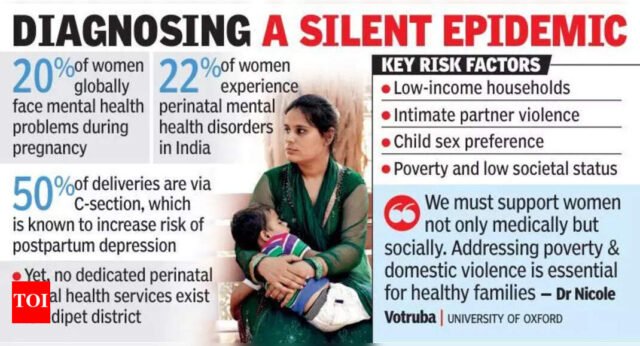Hyderabad: A new study has highlighted a worrying gap in maternal healthcare in Siddipet – untreated mental health issues among women during pregnancy and after childbirth.The study, Perinatal Mental Health in India in the States of Haryana and Telangana: A District-Level Situational Analysis, published in the journal Cambridge Prisms: Global Mental Health, found that despite Siddipet’s strong medical infrastructure, such as a govt hospital with a 30-bed psychiatric ward, trained doctors, and proximity to Hyderabad’s Institute of Mental Health (IMH), the district still lacks dedicated services for perinatal mental health.The study adds that a high number of women are diagnosed with anaemia, hypertension, and diabetes in the first year after childbirth in rural India.Researchers pointed out that nearly 50% of deliveries in Siddipet are via caesarean section, a procedure that is known to triple the risk of postpartum depression. Yet, no structured perinatal mental health services are available in the district.Dr PS Vinod Boboji, medical officer, Siddipet, and one of the study’s authors, stressed the need for regular screening and counselling. “There should be counselling from the very first month of pregnancy, with ANMs and PHC medical officers guiding women on diet, physical activity, sleep, and recognising signs of depression or anxiety. Post-delivery, ANM and ASHA workers should visit mothers at regular intervals — 7th, 14th, 21st, 28th, and 42nd day — to ensure timely intervention,” Dr Vinod said.“The role of family members is equally important, and they also need to be counselled to prevent perinatal mental health issues,” Dr Vinod said, adding that women living in deprived socio-economic conditions, those with low societal status, as well as those experiencing intimate partner violence, are at a much higher risk of perinatal depression.Doctors also pointed out that in Telangana and across much of rural India, it is common for women to stay with their parents from around the seventh month of pregnancy until about 40 days after delivery, especially for the birth of their first child. There, they receive strong support, and isolation is rare. However, after returning to their matrimonial home, women often get little support and must handle housework along with caring for the baby. Researchers suggest that the impact of this move on women’s mental health needs further study,” said a psychologist from IMH, Hyderabad.While globally, up to 20% of women experience mental health problems during pregnancy, and prevalence is significantly higher for women in low- and middle-income countries, in India about 22% of women face such mental disorders.Dr Nicole Votruba from University of Oxford, another author of the study, said that the findings from the PRAMH project underscore the profound impact of social determinants. “These markers include child sex preference, domestic violence, and poverty, which have a significant impact on maternal mental health. It is imperative that we not only prioritise the mental health of women but also address these underlying social challenges within the communities. Supporting women in both areas is essential for fostering healthier mothers, children, and families, and stronger societies.”






